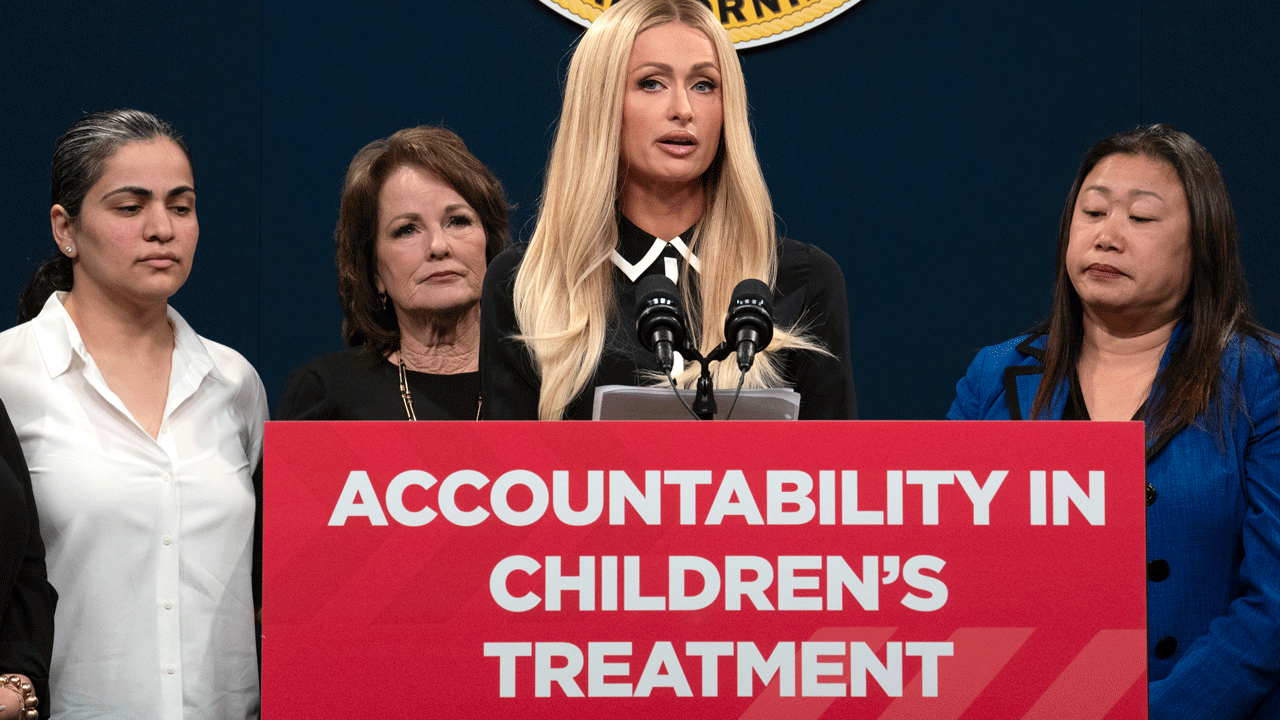
SACRAMENTO, Calif. (AP) — Paris Hilton joined California state lawmakers Monday to push for legislation aimed at cracking down on the industry that cares for troubled teens by requiring more transparency from youth treatment facilities.
The bill supported by the Hilton Hotel heiress and media personality aims to pry open information on how short-term residential facilities for youth dealing with substance abuse and behavioral issues use disciplinary methods such as restraints or seclusion against minors. It would require such centers to notify parents and the state any time they use restrains or seclusion rooms for minors. It’s authored by Republican state Sen. Shannon Grove and Democratic state Sens. Aisha Wahab and Angelique Ashby.
“I know firsthand the horrors that happened behind the closed doors of youth residential treatment facilities,” Hilton said at a Monday news conference at the state Capitol. “In troubled teen industry facilities in California, Utah and Montana, I was subjected to abuse disguised as therapy, isolated from the outside world and denied even the most basic rights.”
Hotel heiress and media personality Paris Hilton, center, discusses a proposed bill calling for more transparency for youth treatment facilities during a news conference in Sacramento, Calif., Monday, April 15, 2024. (AP Photo/Rich Pedroncelli)
She added: “I will fight until every child is safe and keep shining my huge spotlight on these abuses.”
Hilton has become a prominent advocate for more oversight and regulation of teen treatment centers after publicly sharing the physical and mental abuse she suffered as a teenager at a boarding school in Utah. She alleged staff members would beat her, force her to take unknown pills, watch her shower and send her to solitary confinement without clothes as punishment.
In 2021, her testimony about her experience at Utah’s Provo Canyon School helped pass a bill to impose stricter oversight over youth treatment centers in the state. Hilton has also traveled to Washington D.C. to advocate for federal reforms and helped changed laws to protect minors in at least eight states. Earlier this month, she spoke in support of boys sent to a private school for troubled teens in Jamaica.
She’s scheduled to testify in a legislative hearing on California’s bill later Monday. Under the bill, facilities would have to report details such as what disciplinary actions were taken, why and who had approved the plan. The state department regulating the facilities also would be required to make public the reports and update the database on the quarterly basis. It would not ban the use of such practices.
Between 2015 and 2020, California sent more than 1,240 children with behavior problems to out-of-state facilities due to the lack of locked treatment centers for youths, according to Sen. Grove’s office. As reports about abuse happening at these programs emerged, including an incident where a 16-year-old boy died after being restrained for about 12 minutes at a Michigan facility, California also found significant licensing violations at these facilities and decided to do away with the program in 2020. Legislation passed in 2021 formally banned the use of out-of-state residential centers. Democratic Gov. Gavin Newsom also authorized $8 million to bring all the minors home by last year.
CLICK HERE TO GET THE FOX NEWS APP
Minors with behavioral issues are now sent to in-state short-term residential centers, which were created in 2017 to replace group homes. But under current laws, these facilities are not required to share information on how often they use seclusion rooms, restraints, and how many times those methods result in serious injuries or deaths.
“We must require the highest level of transparency and accountability in care for our vulnerable population,” Grove, the author, said Monday. “This is a small but critical measure.”








